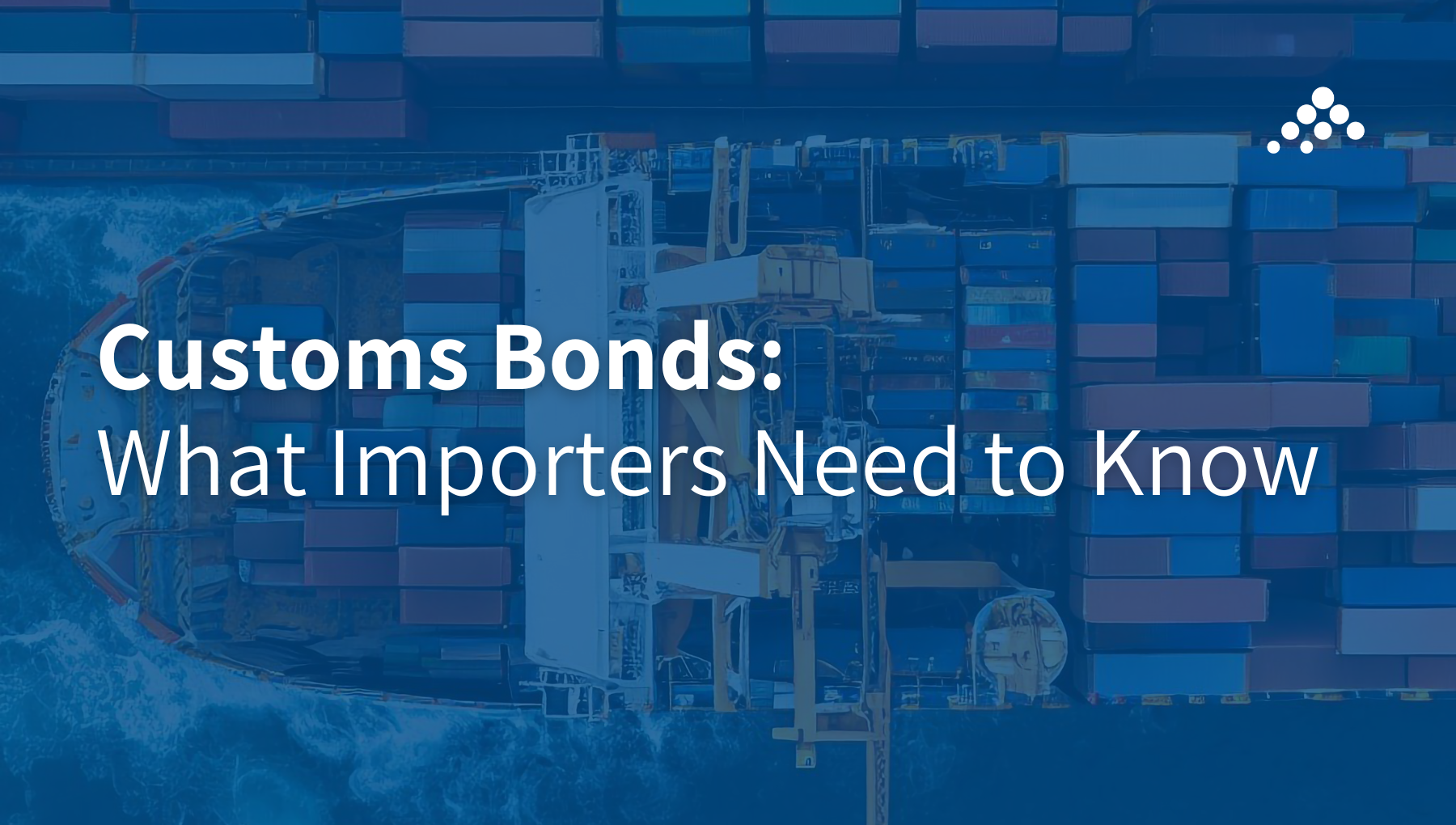Customs Bonds: What Importers Need to Know
01/27/2025

When importing goods into the United States, there are various customs regulations that importers must comply with to ensure their shipments clear customs smoothly. One of the most critical requirements is securing a customs bond. But what exactly is a customs bond, and why is it essential?
In this guide, we’ll break down the basics of customs bonds, the types available, their costs, and why they’re a crucial part of your import journey within international trade.
What is a customs bond?
A customs bond is a financial guarantee between the importer, U.S. Customs and Border Protection (CBP) and a surety company. It ensures that all duties, taxes and fees associated with goods imported into the United States are paid to the government. The bond acts as a safeguard for CBP in the event the importer fails to meet these financial obligations.
To help navigate the complex customs regulations, many importers use the services of a licensed customs broker. Brokers are well-versed in the regulations and can assist with filing the necessary paperwork and obtaining the right customs bond for your shipment.
Why is a customs bond needed?
In most cases, customs bonds are required for Importer Security Filings (ISF) as well as commercial imports valued at $2,500 or more. Additionally, any shipments that are subject to government oversight (such as food, firearms, or vehicles) require a bond, regardless of their value. The bond ensures that all taxes, duties and fees owed to the U.S. government are collected, and that the importer complies with international trade laws.
Without a customs bond, your goods will not be cleared by customs, potentially leading to costly delays, storage fees or even penalties.
What are the different types of customs bonds?
There are two main types of customs bonds available for importers: single-entry bonds and continuous customs bonds.
- 1. Single-Entry Bond (Single Transaction Bonds)
A single-entry bond, also known as a single transaction bond, covers a one-time import shipment into the United States. This type of bond is best suited for businesses that import goods infrequently or for specific, high-value shipments. The bond only covers one entry into the U.S., meaning it must be secured again for future imports.
- 2. Continuous Customs Bond
A continuous customs bond covers multiple shipments over the course of a year. This type of bond is often more cost-effective for frequent importers, as it eliminates the need to secure a bond for each individual shipment. The minimum bond amount, at this time, is $50,000, which would cover $500,000 in duty over the course of one year. Bonds increase by $10K until the bond reaches $100K, and then the bond will increase by $100K increments. An importer is responsible to review and determine their duty responsibility over the course of 12 months to ensure they obtain the correct bond size.
Continuous bonds renew annually and help ensure compliance with customs regulations across all entries made during the year. A continuous bond will cover the obligations of the ISF filing as well as the regular entry filing. For businesses importing goods regularly, a continuous bond streamlines the process and reduces administrative headaches.
Who are the parties in a bond agreement?
A customs bond involves three key parties, each with a distinct role:
- 1. The Principal
The principal is the importer, the party responsible for bringing goods into the United States. The principal must comply with all customs regulations and is responsible for paying the duties, taxes and fees associated with the shipment.
- 2. The Surety
The surety is the bond provider, typically an insurance or surety company. The surety guarantees that the principal will fulfill their financial obligations. If the principal fails to do so, the surety will pay the U.S. government and later seek reimbursement from the principal.
- 3. The Obligee
The obligee is U.S. Customs and Border Protection (CBP). CBP ensures that all import-related duties, taxes and fees are collected, and the bond protects the government (the obligee) if the importer defaults on these payments.
How much do customs bonds cost?
The cost of a customs bond varies depending on the type of bond and the value of the goods being imported.
- –Single-Entry Bond: The cost of a single-entry bond is generally calculated based on the value of the shipment plus any associated taxes, duties and fees. Rates are based per $1000 in commercial value plus duty. A Single-Entry bond will be required for both the ISF filing and the entry filing.
- –Continuous Customs Bond: A continuous bond has a fixed annual rate, often starting around $550, depending on your total import activity over the year. If your business imports frequently, a continuous bond can save both time and money by covering all shipments within that year.
Navigate customs bonds with Ascent Global Logistics
Selecting the correct type of customs bond is crucial to ensure compliance with U.S. customs regulations and smooth your importing process. Whether you choose a single-entry bond for occasional shipments or a continuous customs bond for more frequent importing, securing the right bond will help avoid costly delays, penalties and compliance issues.
Working with a logistics provider that has a licensed customs brokerage team can also simplify the process and ensure you select the bond that best fits your business’s needs. At Ascent, we can guide you through the process of obtaining a customs bond, so your goods are imported into the United States smoothly and efficiently. Explore our customs brokerage solutions to learn more, or contact us today to get started.
December 9, 2024
Thank you for contacting Ascent!
A member of our team will be in contact within a few business hours.
Okay